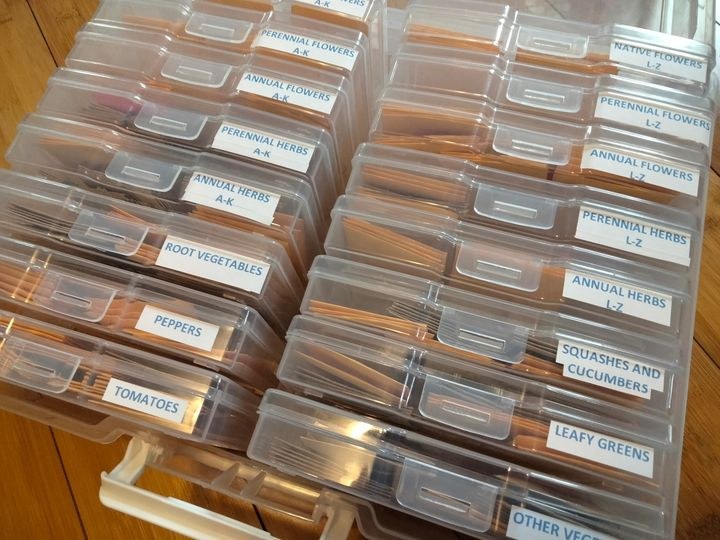The Seed Library Project is closed for 2025 - Over 1,400 seed packs were distributed! The Penn State Extension Master Gardeners of Wyoming County host the Seed Library Project at the Tunkhannock Public Library. The free community resource encourages gardeners of all experience levels to adopt a grow-save-repeat mindset for the home garden by selecting heirloom and open-pollinated varieties of flowers, herbs, and vegetables.

Seed Library box with seed packs. Photo credit: Melissa Wright
What is the Seed Library Project?
The goal of the Seed Library Project is to provide an opportunity for community members to share seeds, encourage biodiversity, and educate gardeners towards a practice of grow-save-repeat. Gardeners of all experience levels are encouraged to discover new family-favorite vegetables, expand collections of native flowers, or start an herb garden. We hope gardeners will take the time to learn the best practices for seed saving and help us replenish the Seed Library stock for next year!
How to use the Seed Library
- Take up to four packs of seed per household per visit.
- Contact the Master Gardeners if you need guidance on best practices for germinating the seeds you selected.
- Save seeds from your garden (heirloom and open-pollinated varieties only) to help replenish our stock for next year. Not sure how? Contact the Master Gardeners. We'll instruct you on the proper way to save seeds.
Why Only Heirloom and Open-Pollinated Varieties?
The Seed Library Project contains only heirloom and open-pollinated varieties. This ensures that the seeds saved from the mature plants will grow true-to-type, provided gardeners prevent cross-pollination (pertains to certain species). Heirloom designates a variety that has been growing for a long time (50+ years). Heirlooms demonstrate stable characteristics from one generation to the next (unlike hybrids). Open-pollinated refers to the way plants are pollinated. Open-pollinated plants rely on wind, insects, and birds for pollination. Cross-pollination can be an issue for certain species.
When is the Seed Library Project Open?
The Seed Library Project opens on Saturday, January 25, at 1:00 p.m. with native perennial seeds that require a period of cold stratification to germinate. In mid-February, vegetable and herb seeds that require an 8-12 week indoor start are added. In mid-March, annual flower, vegetable, and herb seeds that require a 6-8 week indoor start are added. By May 1, the Seed Library Project includes seeds that do not require an indoor start and can be directly sown outdoors, such as beans, cucumbers, summer squash, basil, borage, and sunflowers.
The Seed Library Project is housed at the Tunkhannock Public Library, 220 W. Tioga Street, Tunkhannock, and is available during the library's regular business hours.
Can I Contribute Seeds to the Seed Library Project?
The Master Gardeners can accept donations of properly identified and labeled heirlooms and open-pollinated varieties of vegetables, herbs, annual flowers, and native perennial seeds. For example, seeds identified only as Tomato and Sunflower can not be accepted. However, seeds identified and labeled as Tomato 'Green Zebra' and Sunflower 'Autumn Beauty' are properly labeled as heirloom varieties that are accepted. The Seed Library Project can not accept hybrids.
Questions?
Contact the Master Gardeners of Wyoming County at 570-836-3196 or wyomingmg@psu.edu.
The Seed Library Project contains over 15 species of native perennial flowers.


